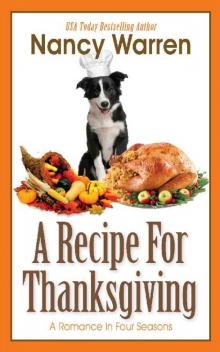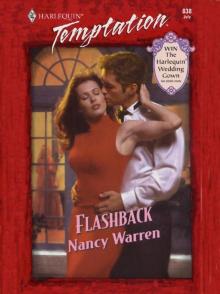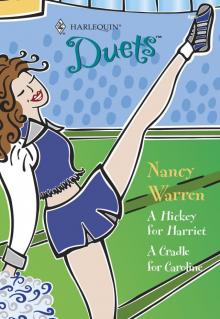- Home
- Nancy Warren
Crumbs and Misdemeanors
Crumbs and Misdemeanors Read online
Contents
Introduction
Chapter 1
Chapter 2
Chapter 3
Chapter 4
Chapter 5
Chapter 6
Chapter 7
Chapter 8
Chapter 9
Chapter 10
Chapter 11
Chapter 12
Chapter 13
Chapter 14
Chapter 15
Chapter 16
Chapter 17
Chapter 18
Chapter 19
Poppy’s Special Recipe for Caramelized Red Onion and Mature Cheddar Soda Bread
A Note from Nancy
Also by Nancy Warren
About the Author
Introduction
Bread is supposed to be the staff of life—not a murder weapon.
Every baker has their weak spot. For Poppy it’s bread. So, when The Great British Baking Contest hits bread week, she’s as fragile as an overbaked croissant. Just when she needs to keep all her focus on flour, water, yeast and salt, another ingredient enters the mix. Death.
Someone is not who they appear to be, and secrets from the past are bringing deadly consequences to the present. Poppy isn’t only a contestant in the long-running TV show, she’s also a witch and reluctant amateur sleuth. With the rest of her coven, assorted animal helpers and her ghostly sidekick Gerry, Poppy needs to solve the murder before someone else dies.
The best way to keep up with new releases and special offers is to join Nancy’s newsletter at NancyWarrenAuthor.com
Praise for The Great Witches Baking Show series
“I loved it! I could not put it down once I'd started it.”
Cissy. Amazon Top 1000 Reviewer
“Such a cute, fun read to kick off a new series!”
Becky, Amazon Top 1000 Reviewer
“I love the story. The characters are wonderful. More, please!”
Barb, Goodreads Reviewer
“This book was funny, sweet and had a good amount of mystery and suspense which kept me invested throughout. I cannot wait to read the next book in this series.”
Erin, Goodreads Reviewer
Chapter 1
Bread had never been my jam, so to speak. Every baker will tell you that there is one type of bake they struggle with—it might be patisserie, biscuits, or getting a fluffy and light genoise. For me, it was bread. I don’t know why I had such a tough time with that seemingly oh so simple staple. It eluded me. Was I being punished by the gluten gods for having a wickedly sweet tooth? The closer we got to bread week, the more my bread wouldn’t perform. Either it didn’t rise properly, or it was too dry, too wet, too heavy, or the crust was hard.
I practiced and practiced—everything from caraway seed loaf to sourdough, although I was pretty sure that the judges wouldn’t demand a sourdough loaf, as it took too long. But still, I wanted to cover all my bases, leave no pizza stone unturned. I couldn’t stop my mind from racing. We were in week six of The Great British Baking Contest, and the competition was getting fierce. I needed to be prepared to defend my weakest spot, my Achilles’ heel of baking. And so I kept up the bread-making. Day after boring day.
As much as I despaired, so too did Mildred, my kitchen ghost. Now I was used to Mildred being a bit of a Debbie downer; she was always griping at me for taking the easy way out, using “fancy technology” to whisk or whip or not knowing the “basics,” which in her Victorian opinion were plum duff (which didn’t, incidentally, have any plums, just suet, dried fruit and egg) or bread made with hop yeast. “Ye begin with hops boiled in water and some potatoes boiled and bruised,” she instructed me. Like I didn’t have enough recipes to try.
Even Gina, my best friend, refused to come over and do another taste test. “Pops, I don’t want to come over and sample rye rusks. Really, love, you’re going off the deep end.” I felt for her. No doubt she couldn’t eat any more combinations of flour, yeast, salt and water plus whatever other ingredients I could dream up. Bread either rises and has good texture and flavor or it doesn’t. It’s not like cake, where you can hide a multitude of faults under icing.
“Bread is boring,” Gina said. “Do your best. You’ll be fine.”
It was easy for her to brush the crumbs under the carpet and say things would be fine. Gina wasn’t a baker; she was a makeup and hair artist—and an excellent one at that. She might think bread was dull, but it was a foundation skill I was going to have to get right. Bread was unforgiving when you messed up, and I couldn’t seem to do anything but make a mess.
By the end of the week, I had gone through sacks of flour, fresh yeast, dried yeast, and a sourdough starter I’d made myself weeks ago, and not one single perfect loaf emerged from my frantic efforts. One evening spent in her favorite spot in the kitchen left Gateau, my black cat familiar, looking like she’d been out in a snowstorm. After that, she watched me from an armchair in the living room. Even my own familiar was tired of my klutzy ways.
It wasn’t only vanity propelling my desperate attempt at bread mastery. I was worried that if I didn’t shine this week, then my days on The Great British Baking Contest would be numbered, and then so would my time at Broomewode Hall, just when I felt like I was making progress discovering more about my birth parents. I could feel in my gut that my dad was a local, someone from Broomewode Village born and bred, and this week I intended to act on this intuition. Which meant sticking around.
Which is why, by the time Thursday evening was approaching, I’d decided I was going to need some expert help on the bread front. And who better to ask than my coven sister Eve? I called her when I knew she’d be setting up for the dinner shift at the inn. After a nice natter catching up, I explained my predicament and was immediately soothed by Eve’s calm manner and her gentle words of encouragement.
“I’m sure it’s not that bad, Pops,” she said. “You’ve come so far in the competition. Don’t let a bout of nerves throw you off now.”
I assured Eve it wasn’t nerves. More like a case of breadstick fingers—I couldn’t knead dough properly to save my life.
Eve laughed. “Look, if that’s really true, then why don’t you come to the inn tomorrow morning? On Fridays, Eloise is in the kitchen. She’s our pastry chef. She hasn’t been here long, but her bread’s excellent. I’ll have a word with her later and see if she’ll give you some tips.”
I jumped up and down on the spot, irritating Gateau, who was napping by my side. I thanked Eve, hung up, and went to face the dreaded mess in my kitchen.
“Poppy Wilkinson, reporting for bread duty,” I said brightly, raising my arm in a salute, like an actor in Dad’s Army, a show my adopted dad had always loved.
Behind the bar, Eve collapsed into giggles. “Don’t worry. Eloise isn’t that tough of a taskmaster.” She paused. “Well, maybe she is a bit. A sweet girl but a little stern. She’ll put you through your paces. But that’s the idea, right?”
I laughed a little nervously and took a seat on a barstool, setting my small suitcase beside me. Gateau had scampered off the minute I opened the car door—no doubt anxious to get away from me and my current obsession.
“By the looks of you, a coffee wouldn’t go amiss.”
I nodded. My baking antics had truly worn me out this week, and the competition hadn’t even started yet. I should have found time to rest, but I was so worried about my bread-making skills that I kept pushing myself all week. I watched with gratitude as Eve made me a cup of hot black coffee.
She talked about her week, and I listened to her chatter about the locals, who’d had a little too much to drink, whose nephew was moving to London, and (most interestingly) that Edward had been unofficially promoted to Broomewode g
amekeeper.
“That’s great news,” I said. I liked Edward. He’d only recently been hired as a gardener, and now he was acting as the gamekeeper as well.
“Even better, he and Lauren were spotted on a date in the next village over. A new French bistro,” Eve said. “Very romantic.”
“I’m glad,” I said, and I meant it. Lauren had been through a terrible time, losing her fiancé on the day they should have married. From what I could sense, Edward was a good man.
I took a sip of coffee and let out a deep sigh. I was going to have to dig deep this weekend. And if that meant a little caffeine injection every few hours, then so be it.
“Ah, here’s our new pastry chef now,” Eve said, and I looked up to see a young woman approaching. She was tall, with a mane of fine hair caught into a butterfly clip and a smattering of freckles, which danced across the bridge of her nose. Her square glasses lent her a serious air, and she was wearing a crisp white apron. She looked to be similar in age to me, but she stooped a little, almost like she was embarrassed by her height and was trying to shrink herself.
“Eloise, meet Poppy, your student for the morning.”
I grinned and stood up to shake Eloise’s hand.
“I hear you’ve been doing battle with dough this week,” she said, her voice deep and mellow.
“Battle is the word,” I agreed. “Thank you so much for agreeing to show me a few tips. You’ve no idea what it means to me.”
Eloise assured me she’d share her knowledge of how to work with different grains and textures. “Wheat, rye and barley—they’re all different beasts. You can’t treat them the same way,” she warned.
I drained my coffee and then followed her through to the kitchen, which was behind a set of double doors adjacent to the bar.
“Good luck,” Eve called out.
I’d never spent much time in the inn’s kitchen before, and I was surprised by how large it was. In spite of the inn’s antiquity, the kitchen was modern, home to huge stainless-steel gas ranges, multiple fridges and worktops. The place was gleaming, and the scent of lemon cleaner mingled with baked goods. At 9 a.m., the morning sun shone through the windows. As much as I loved my cottage, I couldn’t wait to bake in such a well-equipped and spacious kitchen. I said as much to Eloise, but she just shrugged. “It’s not that glamorous when you’re elbow-deep in flour.”
“We’ve got the kitchen to ourselves?” I was surprised and pleased not to have kitchen staff overlooking my sad efforts.
“Sol is outside unloading a delivery with his sous chef, so he’ll be coming in and out. Don’t mind him. He doesn’t interfere with my work, and I stay out of his.”
Sounded to me like Eloise and the head chef weren’t best pals.
“Are you sure you have time to help me?” I didn’t want to get under her feet or in her way at work.
“Sure. I’ve already finished the desserts for today. I’ve a bit of time. Happy to help. Come in the pantry and we’ll collect our ingredients.”
“Can I?” I half whispered, giddy with excitement. It wasn’t a very rock-’n’-roll indulgence, but a big pantry with loads of shelving was a baker’s catnip.
Eloise laughed. “Come on, then.”
I slid back the heavy door and gasped in delight. It was wonderful. Rows and rows of tinned goods, marmalades and preserves; condiments of all kinds; oils and vinegars; a wall of spices, all neatly organized and labeled; mason jars containing cocoa, nuts and seeds. There were trays of potatoes, onions and root vegetables; and giant sacks of flour, rice, and different sugars all grabbed my attention as I gazed about me.
“Wow,” I said.
“Pretty special,” Eloise said. “We try to use as much local produce as possible. Eve told me that you’re a friend of Susan Bentley’s—that’s her honey over there. Her eggs are amazing, too. They have the perfect orange yolks.”
I nodded in agreement. “Susan says they’re happy eggs, as they come from happy hens. I think if I worked here, I’d spend all day in the pantry, sampling things and coming up with different recipes.”
At that, Eloise frowned, and I felt like I’d touched a nerve. Maybe I was being too presumptuous. Working in a kitchen was a very different thing to being an amateur baker. It was a lot of hard work and long, unsociable hours.
“I wish,” she replied. “Too busy folding a hundred croissants a day for that! Speaking of which.”
She turned away from the pantry, pulled the doors to a close, and patted the work surface. Next to her hand was a huge steel mixing bowl, a set of electric scales and a wooden spoon. “I’ve worked in kitchens a long time,” she said, “and if there’s one thing I’ve learned in this business is that in order to stand out, you’ve got to come up with something that reflects who you are. Be the best, even if it’s for one cake. Like the best turf cakes in York. Aim for making the local papers and becoming renowned for one thing.”
I nodded eagerly, even though I had no idea what a turf cake was. I whipped a notebook out of my bag and flicked to a blank page. I wanted to remember every little detail.
“This is what I know about bread,” she said, drawing herself up to her full height. “Yeast is a fickle mistress. You have to know how to handle her right; otherwise she’ll spoil. And you have to let her do things in her own time. Most bread products usually have two separate occasions where they’re left to rise. This’ll be tricky for you tomorrow.”
“They give us extra time for bread week,” I said, nodding, “so that it can prove. The showstopper is filmed in two parts, even though it’s cut to look like one long session.”
I clapped my hand to my mouth. I so wasn’t supposed to give away any show secrets.
Eloise laughed. “Don’t worry. I won’t tell.”
She continued to share her bread tips, letting me know that after the first rise, I needed to punch all the gas out of the dough to get rid of any large bubbles that might have been created. “That way, the yeast stays strong enough for a second rise. This is how you get good texture,” she said.
I already knew this, but it was theoretical knowledge, and for some reason, my brain and my hands didn’t seem to be working together.
“Then the yeast will be strong enough for a second rise,” she continued. “It’s on this second rise that the bubbles will appear more even and create a better texture.”
She continued, telling me that by the time I took my bread to the oven, I wanted “a medium firmness with uniform bubbles,” she said. “If you leave it too long to rise, the yeast fizzles out.”
“That’s overproving, right?” I said, eager to display the little knowledge I did have.
She nodded. “If you want a light and airy texture, then those gas bubbles must stay intact. Breadmaking is more science than art. Your measurements must be exact. No throwing a little of this and a little of that in and thinking it’ll work. In a cake batter, you often get away with sloppy measurements. Not with bread.”
Were my troubles as simple as that? I was a little sloppy in my measurements. I began to feel better thinking that if I was careful to be precise this weekend, I might be all right.
“Right. I’m making a simple white French loaf for the morning. I only need two loaves. You can make it. Let’s see how you do.”
“Okay.” I hoped I didn’t fail my first test.
“I keep the white flour in here,” she said, pulling out a metal-lined drawer that was her flour bin. We fetched yeast and salt from the pantry.
Next Eloise said she wanted to watch my technique. “Just be natural. Do your thing.”
Yeah, like I could act naturally under the eye of a professional baker.
I started to weigh the flour, reminding myself that the world would be watching via their televisions whatever I did tomorrow, and in thinking of both those things managed to drop flour onto the counter, where it then spilled onto my jeans.
“I’d better fetch you an apron from the laundry delivery outside,” Eloise said. Oh, I was off
to a good start.
I picked up the sieve and carried on with the familiar routine but this time feeling more hopeful. I was so happy Eve had set up this quick teaching session with a bread baker who clearly knew her stuff.
I finished sieving and looked out of the open window, wondering whether to wait until Eloise returned. Seemed to be taking a long time to collect an apron. I caught sight of two men unloading crates of produce from a white van through the open window. One of the men was much bigger than the other, burly and tattooed, and he carried himself in such an assured manner that I was positive he was the head chef, Sol. The other man was much smaller and more wiry. He darted from the van to a loading trolley with quick, light steps. They seemed to be working in silence, in the kind of easy rhythm two people have when they’ve been working side by side for a long time.
Eloise emerged from the front of the van, apron in hand, and stopped by the chef. He put down a crate of potatoes with a look of sheer annoyance.
“I was hoping to catch you,” Eloise said, her deep voice floating in through the open window.
“I’m busy,” he replied. He had a gruff voice that suited his heavyset body.
“Just a quick word.” She glanced at the other guy. “In private.”
Sol looked at the other man and said something I couldn’t quite catch.
The two of them moved away from the van and towards the window. I darted out of sight. I didn’t want Eloise to think I was eavesdropping, although that was exactly what I was doing. Besides, if I moved, they might see me.

 The Almost Wives Club: Kate
The Almost Wives Club: Kate The Vampire Knitting Club: First in a Paranormal Cozy Mystery Series
The Vampire Knitting Club: First in a Paranormal Cozy Mystery Series Stockings and Spells: A paranormal cozy mystery (Vampire Knitting Club Book 4)
Stockings and Spells: A paranormal cozy mystery (Vampire Knitting Club Book 4)_preview.jpg) Chance Encounter (Take a Chance: Prequel)
Chance Encounter (Take a Chance: Prequel) Let it Snow
Let it Snow Kiss a Girl in the Rain
Kiss a Girl in the Rain A Spelling Mistake
A Spelling Mistake Fair Isle and Fortunes
Fair Isle and Fortunes A Recipe for Thanksgiving
A Recipe for Thanksgiving If the Dress Fits
If the Dress Fits Cat's Paws and Curses
Cat's Paws and Curses A Midsummer Night's Wedding
A Midsummer Night's Wedding Arthur
Arthur Bobbles and Broomsticks
Bobbles and Broomsticks Jack
Jack Crumbs and Misdemeanors
Crumbs and Misdemeanors Crazy Ride
Crazy Ride George
George The Wedding Flight
The Wedding Flight Fast Ride
Fast Ride A Diamond Choker for Christmas
A Diamond Choker for Christmas Baker's Coven
Baker's Coven Bridesmaid for Hire
Bridesmaid for Hire Stitches and Witches: A Paranormal Cozy Mystery (Vampire Knitting Club Book 2)
Stitches and Witches: A Paranormal Cozy Mystery (Vampire Knitting Club Book 2) Diamonds and Daggers
Diamonds and Daggers Ribbing and Runes
Ribbing and Runes Courting Chloe
Courting Chloe Blood, Sweat and Tiers
Blood, Sweat and Tiers By the Book
By the Book My Fake Fiancee
My Fake Fiancee A Dog Named Cupid
A Dog Named Cupid Chapter and Curse
Chapter and Curse Her Valentine Fantasy
Her Valentine Fantasy The British are Coming Box Set
The British are Coming Box Set Lace and Lies
Lace and Lies Wild Ride
Wild Ride Unwrapping Santa
Unwrapping Santa Popcorn and Poltergeists
Popcorn and Poltergeists Best Man...with Benefits
Best Man...with Benefits Breathless
Breathless Frosted Shadow - A Toni Diamond Mystery
Frosted Shadow - A Toni Diamond Mystery Crochet and Cauldrons: A paranormal cozy mystery (Vampire Knitting Club Book 3)
Crochet and Cauldrons: A paranormal cozy mystery (Vampire Knitting Club Book 3) Sea Kissed, A Crane Series Romance: Crane Series
Sea Kissed, A Crane Series Romance: Crane Series Bad Boys Down Under
Bad Boys Down Under Aftershocks
Aftershocks French Kissing
French Kissing Too Hot to Handle
Too Hot to Handle The Fourteen Million Dollar Poodle
The Fourteen Million Dollar Poodle The Great Witches Baking Show
The Great Witches Baking Show Hot Off the Press
Hot Off the Press British Bad Boys
British Bad Boys By the Book_A laugh-out-loud feel good romantic comedy
By the Book_A laugh-out-loud feel good romantic comedy Star Kissed: A Crane Series Romance
Star Kissed: A Crane Series Romance Secondhand Bride (The Almost Wives Club Book 2)
Secondhand Bride (The Almost Wives Club Book 2) FLASHBACK
FLASHBACK A Hickey for Harriet & a Cradle for Caroline
A Hickey for Harriet & a Cradle for Caroline The Trouble with Twins
The Trouble with Twins Iris in Bloom: Take a Chance, Book 2
Iris in Bloom: Take a Chance, Book 2 Face-Off
Face-Off The Vampire Knitting Club: A cozy paranormal mystery series
The Vampire Knitting Club: A cozy paranormal mystery series Private Relations
Private Relations Ultimate Concealer, A Toni Diamond Mystery: A Toni Diamond Mystery (Toni Diamond Mysteries)
Ultimate Concealer, A Toni Diamond Mystery: A Toni Diamond Mystery (Toni Diamond Mysteries) Just One Night
Just One Night Breakaway
Breakaway Midnight Shimmer: A Toni Diamond Mystery (Toni Diamond Mysteries Book 3)
Midnight Shimmer: A Toni Diamond Mystery (Toni Diamond Mysteries Book 3) Live a Little!
Live a Little! Bayou Bad Boys
Bayou Bad Boys Sun Kissed (Crane Series)
Sun Kissed (Crane Series) Rich Bitch: Everything's Going to the Dogs
Rich Bitch: Everything's Going to the Dogs Game On
Game On Shotgun Nanny
Shotgun Nanny Steamy Southern Nights
Steamy Southern Nights